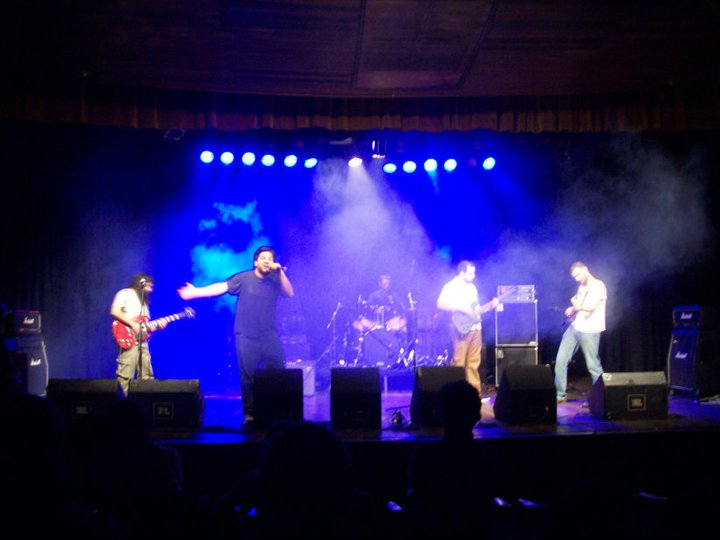
Los Pazientes are Marcel Studebaker (drums, percussion, backing vocals), Diego Carusso (guitars, backing vocals), Uvit Cropa (bass, loops, samplers), Juan Zoop (vocals) and Ramón Guayomin (guitars, backing vocals).
To many, the end of the ‘60s was the true culmination of an era. But to others, it was just the beginning of a fight that rages to this day. The former look at Woodstock and recall Pete Townshend’s immortal words about the event, “what they [hippies] thought was a new reality was actually a field full of people covered in mud and sheep shit… if that’s the new world they want to live in, then fuck the lot of them”. The latter regard Woodstock as the triumphant day of activism bar none, as the event that could congregate people from different corners of America who where there to incarnate a message of relentless change and renewal.
Each person is free to have his own interpretation of what happened that day, and the true significance it had. Personally, when I look at the events that took place right after Woodstock (including Altamont, the Manson murders and the seismic punk revolution at the tail end of the ‘70s) I am inclined to look at explicit calls to action with eyes that are not so eager. Someone once said that the only answers that have any value in life are the ones we arrive at ourselves. I think the same applies to any philosophy, or course of action. The ones that can take us to a positive conclusion are the ones we elaborate ourselves. And I don’t know if you remember the song “Follow The Cops Back Home” by Placebo, but I hope you do because it has a phrase that summarizes what I wrote above, and that lets me introduce you to the Uruguayan unsigned artist I want to cover today.
During its flourish, “Follow The Cops Back Home” has a verse that goes:
The call to arms was never true
I’m medicated, how are you?
That verse cannoned into my head when I discovered the music of Los Pazientes [The Patients]. There was something incredibly accurate about those words, and how they connected the band’s moniker with its intent of purpose.
To quote Los Pazientes [English text below]:
“Los Pazientes fueron concebidos principalmente como respuesta a la necesidad de generar un espacio de distribución y exhibición de un mensaje propio, que se compromete con la búsqueda de buenos espíritus, la lucha de algunos pueblos y de la guerra en contra del amor. A través de la música, (muchas veces el rocanrol) Los Pazientes, proponen incentivar y proteger en cualquier circunstancia ese mensaje, mediante la colaboración, organización y cooperación de diferentes artistas.”
[The Patients were primarily conceived as an answer to the need for a space in which to distribute and spotlight a message of its own, pledged to find good spirits, the fight of some nations and the war against love. Through music (often rock ‘n’ roll) The Patients aim to encourage and protect this message at all times, by making the collaboration and cooperation among different artists possible.]
There you go. As far as calls for action go, this is imbued by as much directness as temperance. It is something very representative of what the band is about, both musically and lyrically. There are echoes of liberation throughout its music (such as in the song “Rojo Y Negro” [Red and Black]), but what I read in the vast majority of cases is a call for individual action, with full awareness of the consequences that one’s decisions will have on a larger scale. It is the kind of subtle difference that has a substantial weight in the end. It is the one lesson that I feel we should learn from the idealism that music knew in the ‘60s, and the violent ramifications that such an idealism gave way to as the ‘70s became more and more divided, and some flags were waved and others burned indistinctly.
And in the end, the conquest of love is the biggest concern in these stories of arsonists in basements that realize they have new things to say and new horizons to strike for, of characters who tell storms about their own inner storms, as drums catch fire and music that lasts longer than one’s own blindness and limitations fills the surges of the air.
“Quiero escuchar el último latido en el hondo amanecer sin vos” [“I want to listen to the final heartbeat in the deep dawn without you”]. These lines close “El InZenDiario” [The Arsonist]. It is up to the listener to imagine how the day following that dawn will shape itself. Whether things will be ideal or real. Whether there is time enough to change oneself and his own preconceptions when it comes to what he wants to do and how that relates to what ought to be responsibly done.
So… I’m medicated, how are you?
I guess it doesn’t matter.
We’ll take a dive, swim right through.
There’s no stopping until the other side has been reached.
This is the band’s MySpace profile.
